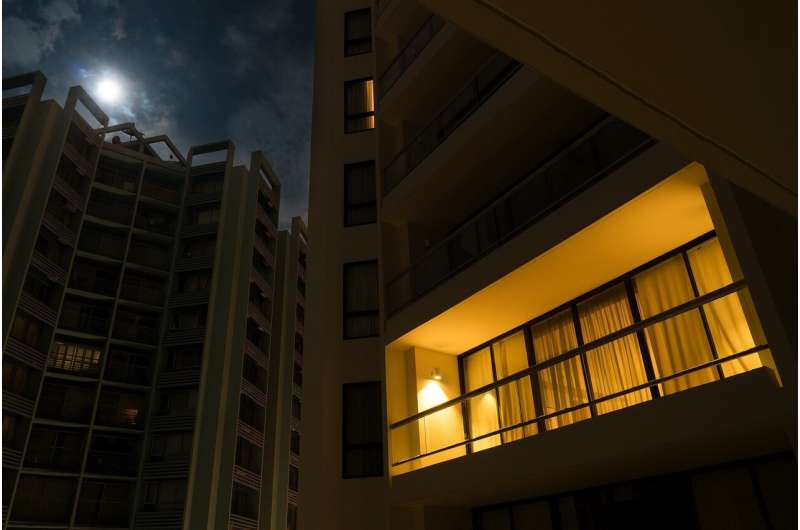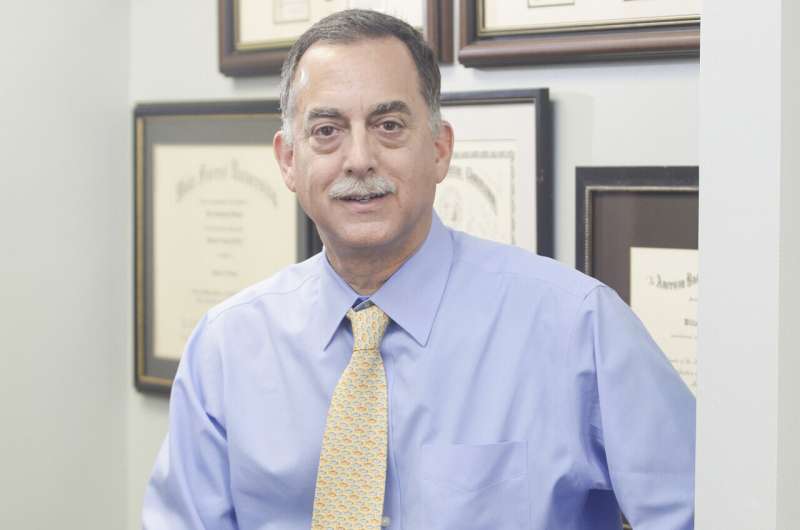Pandemic significantly increases insomnia in health care workers

The COVID pandemic appears to have triggered about a 44% increase in insomnia disorder among health care workers at a medical-school affiliated health system, with the highest rates surprisingly among those who spent less time in direct patient care, investigators say.
Another surprise was that about 10% of the group of 678 faculty physicians, nurses, advanced practice providers, like nurse practitioners and physician assistants, as well as residents and fellows, reported in a 17-question survey that their insomnia actually got better in the early months of the pandemic, says Dr. Vaughn McCall, chair of the Department of Psychiatry and Health Behavior at the Medical College of Georgia at Augusta University.
Still another surprise was the high reported insomnia rate among the group—44.5%—pre-pandemic, McCall and his colleagues report in the Journal of Clinical Sleep Medicine.
"There are a lot of studies looking at sleep insomnia problems in response to natural disasters like an earthquake in Peru or a typhoon in Taiwan, but this is a universal stress," corresponding author McCall says of the year-plus old COVID pandemic.
While McCall, an expert in the trifecta of insomnia, depression and suicide, expected the pandemic to affect workers' sleep and rates of acute insomnia disorder to increase, the rate of the increase was still surprising: from 44.5% to 64%.
The May 15, 2020 survey, which investigators limited in scope so it wouldn't add to the burden of already overburdened health care workers, covered basics like demographics, work habits, mood and anxiety symptoms and indicators of acute insomnia disorder—not just episodic problems with sleep that might commonly be referenced as insomnia. Respondents were 72% female, a mean age of 43 and included a lot of faculty physicians and staff nurses, McCall says. About 25% of the respondents were shift workers but sleep problem rates were similar regardless of whether they worked day- or night-shifts. Most were providing at least 30 hours of direct patient care weekly before and during the pandemic.
Survey takers were asked to reflect on work assignments for the two weeks before SARS-CoV-2 infections began to increase and impact the function of health care facilities and society, as well as the two weeks before the survey. On the May 2020 survey date, the health system had an average daily census of 21 COVID-19 patients, with four in intensive care. In mid-March, state leaders had asked that health care workers perform non-patient care duties at home.
The clear impact of insomnia on health care workers overall implies that health care leaders need to be aware of the association, both in staff on the frontline and working from home, the investigators report.
The combination of insomnia and anxiety over COVID-19 represents a potent risk for suicidal ideation, they write, and the medium number of insomnia symptoms indicates that severity was "of clinical significance" to the workers.
Previous studies have looked at the impact of COVID on more common sleep problems in health care workers, but the new study looked at more defined and potentially problematic acute insomnia disorder.
"Insomnia disorder is a patient complaint of poor sleep either in quantity or quality—it can be both—with daytime consequences of their poor sleep," McCall says. "They suffer in the daytime because of the nighttime," he says.
In this case, reported consequences included fatigue, malaise, reduced initiative, even gastrointestinal problems. More than half the individuals in the survey reported at least one core symptom of depression, while at least one anxiety symptom was reported by nearly 65%.
"We see a lot of people who work too much at one job, or they hold down two jobs and there is simply not enough time to sleep," McCall says. "They don't have insomnia, if anything they have the opposite, which is sleep deprivation. Insomnia disorder requires that you at least have the opportunity to sleep," he says.

Insomnia disorder affects about 10% of the general population, and the acute insomnia disorder reported by health care workers is generally defined as a problem that stretches for weeks, while chronic insomnia disorder lingers for months or years. Acute insomnia may progress to a chronic disorder.
There are not good numbers on insomnia disorder rates among health care workers pre-COVID, McCall notes. The purposeful limit to the length of the survey also meant respondents did not provide insight on how long they had problems with insomnia pre-COVID or why, but there are logical factors like the ongoing stress and responsibility of caring for the sick and injured.
Investigators also logically presumed more time spent in the direct care of patients would mean increased risk/concern about COVID exposure, more worry and more insomnia, they write.
That's why one of the most interesting and surprising findings was that about 10% of respondents reported their insomnia had improved after the onset of COVID, potentially because working from home was a good fit for them, but again the survey did not ask for those kinds of details, McCall says.
Most of us complain about isolation, the inability to easily visit with our friends and family and go to restaurants, McCall says of social repercussions of the ongoing pandemic, and he is among them. "Isolation for most people has been bad, but there are people who love it."
Since those not involved in the direct care of patients had to work at home, the investigators hypothesized that for some of these individuals, working from home was not a good fit. Rather, trying to work while juggling the daily, online educational demands of school-age children as well as the ongoing needs of all their children was a significant, potentially insomnia-provoking stress.
He notes that the majority of respondents who spent 30 or more hours each week in direct patient care, tended to be younger than those who worked less, and age increases the overall insomnia risk. Fatigue resulting from those directly involved in hands-on care could also be a factor in promoting better sleep for those who remained on the frontline and help explain the surprising disparity.
The lack of a more typically structured day, with generally set times to work, be at home and sleep, might also be a factor. McCall notes the pandemic has also brought more college students into his practice who had to move back home and were struggling with staying up late and getting up late.
"If you work from home there is a risk that your sleep is going to fall apart because you don't have your schedule anymore," he says. "Most people don't self-regulate well."
He plans to survey the group again when the pandemic has subsided. Meanwhile, the MCG Department of Psychiatry and Health Behavior, under the direction of Dr. Lara Stepleman, chief of psychology and director of the MCG Office for Faculty Success, is offering phone, video or in-person consultations; confidential weekly online group meetings where they can discuss the issue with their peers; and short-term telehealth or in-person psychotherapy and medication management to their colleagues.
McCall notes that generally speaking insomnia is more common in females, as it was in the survey.
Insomnia is associated with the risk of developing mental health problems like depression, as well as increased risk of suicidal thoughts and behavior and overall poor quality of life, the investigators say.
Both good and bad personal life events, like an upcoming wedding or a divorce, respectively, can precipitate acute insomnia disorder.
More information: William V. McCall et al. Short-term insomnia disorder in health care workers in an academic medical center before and during COVID-19: rates and predictive factors, Journal of Clinical Sleep Medicine (2020). DOI: 10.5664/jcsm.9034



















